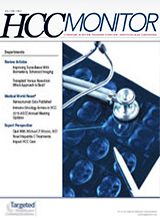Novel Hepatitis C Treatments Impact HCC Care: Q&A With Michael P. Manns, MD
Novel agents that target the replication of the hepatitis C virus are poised to have a far-reaching impact on the prevention and recurrence of hepatocellular carcinoma (HCC).
Michael P. Manns, MD
Novel agents that target the replication of the hepatitis C virus are poised to have a far-reaching impact on the prevention and recurrence of hepatocellular carcinoma (HCC). This impact could be far-reaching, since in North America the primary risk factor for HCC is hepatitis C virus infection, which leads to the disease in approximately 50% of patients. In other countries this rate fluctuates, reaching 65% in Japan and closer to 20% in Asia and Europe.
As the leading cause of HCC, novel treatments for hepatitis C can have a dramatic impact on the incidence of the disease and potential treatment strategies. In a recent keynote presentation at the 2015 World Congress on GI Cancer, Michael P. Manns, MD, noted that the goal in 10 to 20 years is to have no more liver transplantation due to hepatitis C virus-positive HCC. Additionally, Mann hopes that in the future there will no longer be hepatitis C-associated liver cancer, which he said could only be realized through global access to novel therapies, like simeprevir (Olysio) and sofosbuvir (Sovaldi).
For further insight into the relationship between advances in hepatitis C care and the future of HCC treatment,Targeted Oncologyspoke with Manns, director, Department of Gastroenterology, Hepatology, and Endocrinology, Medical School of Hannover in Germany, at the World GI Congress.
Targeted Oncology:What are the main goals in treating HCC?
Manns: Prevention is key. We know that preventing or reversing cirrhosis is the best way to prevent liver cancer development. Once it occurs, we need to treat the early stages by locoregional therapies or surgery. Then, clearance of the hepatitis C virus should be significant in reducing the risk of recurrent disease. If you cure the virus before cirrhosis develops, that is key. Finally, we need to eradicate the hepatitis C entirely and that may be difficult without a vaccine, but we are on the right track. Another issue in hepatitis C prevention is accessibility and cost. However, the building blocks to solve this are available.
How has the treatment of hepatitis C changed in recent years?
Previous treatment for hepatitis C, which was mostly limited to ribavirin and interferon, was 1-year long and full of side effects and drug interactions with HCC treatments. Now, the new direct-acting antiviral agents have high cure rates of more than 90%, almost no side effects, and only take on an average of 12 weeks to administer.
It is interesting to see how fast the field of hepatitis C is moving. Most of the data are still from the interferon days, so we need to really revaluate everything, especially since these new agents and combinations have been approved.
What questions remain unanswered in the treatment of hepatitis C­associated liver cancer?
For patients who can receive curable therapies for hepatitis C who already have HCC, clearing the virus reduces the risk of recurrent disease. However, we are missing data for patients in palliative treatment for advanced disease. We are unsure of the impact clearing hepatitis C in that population has on liver cancer.
Moreover, it is important to take note of patients with hepatitis C who receive a transplant. In the past, reinfection has been universal, and recurrent hepatitis C had very inferior outcomes compared to other indications for liver transplantation. Therefore, the first goal should be to get the hepatitis C population after transplantation free of hepatitis C and prevent reinfection.
We need to determine whether and to what extent hepatitis C treatment can prevent cancer. This is particularly relevant in those with liver cirrhosis. In the past, this was easier to prove because only half of those treated for hepatitis C responded to treatment and we could compare responders to nonresponders. Now with cure rates at almost 90% for hepatitis C, we have very few nonresponders. Therefore, the control group would be hard to find. It is unethical to not treat for hepatitis C, so I think treating for hepatitis C will be recommended in the future. The message should be: if you clear the virus, the risk of liver cancer is significantly reduced.
We may need to develop new strategies for surveillance of patients who have been treated for hepatitis C. We know that increased age is associated with risk of having high-alpha one fetoprotein.
Are there patients with HCC who should not be treated for hepatitis C?
If the HCC prognosis is very inferior and survival is not likely, then treating for hepatitis C may not be beneficial. We do not know if treating hepatitis C could be detrimental to some patients at this time, so that is something that needs to be considered with each advanced patient.

Survivorship Care Promotes Evidence-Based Approaches for Quality of Life and Beyond
March 21st 2025Frank J. Penedo, PhD, explains the challenges of survivorship care for patients with cancer and how he implements programs to support patients’ emotional, physical, and practical needs.
Read More